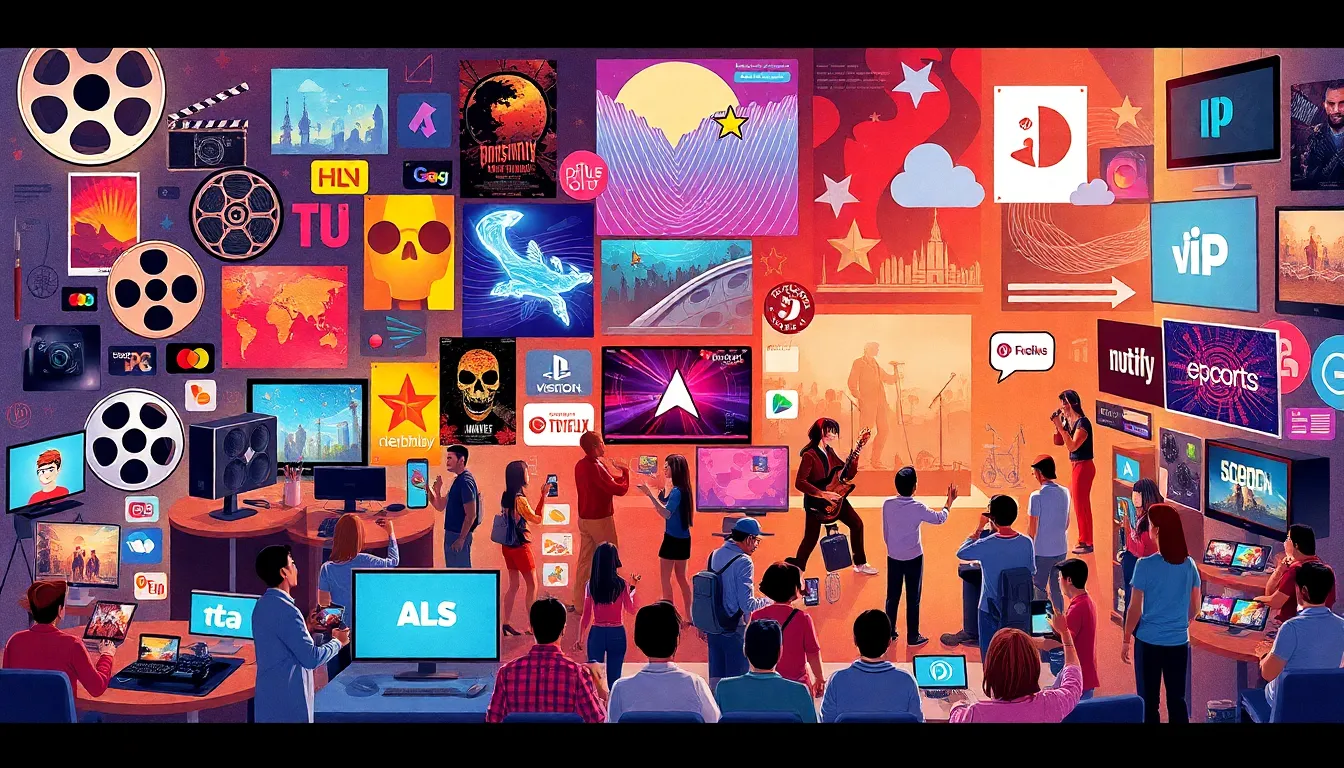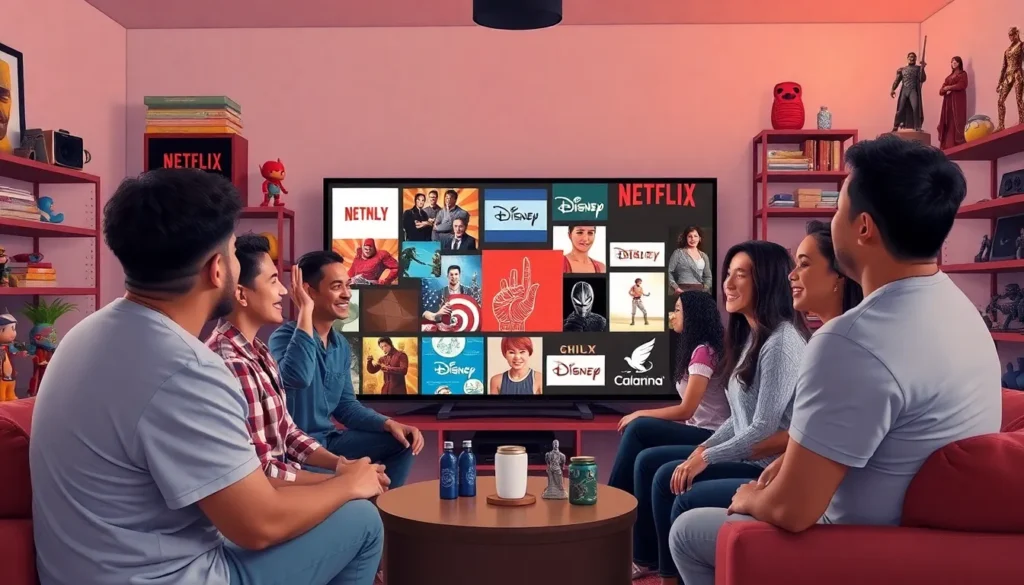In a world overflowing with choices, entertainment brands are the superheroes of our downtime, swooping in to save us from boredom. From blockbuster movies to binge-worthy series and catchy tunes, these brands don’t just entertain; they create experiences that stick with us long after the credits roll.
Imagine a life without your favorite streaming service or the latest viral video sensation. It’s like a pizza without cheese—just plain sad. Entertainment brands have mastered the art of keeping audiences glued to their screens, making them not just a part of our lives but a vital ingredient in our daily escapades. Join the ride as we dive into the dynamic universe of entertainment brands and explore how they shape our culture, influence trends, and keep us laughing, crying, and cheering for more.
Entertainment Brands
Entertainment brands influence daily life through movies, television shows, and music. These brands cultivate emotional connections by enhancing experiences. Iconic companies like Disney and Netflix shape popular culture with their expansive libraries. They create memorable characters and stories that resonate with diverse audiences. Each brand offers unique experiences that cater to various tastes and preferences.
Merchandising also plays a crucial role in brand expansion. Products like clothing, toys, and collectibles leverage beloved franchises, fostering deeper connections. The synergy between entertainment and consumer products strengthens loyalty among fans. Cross-promotional campaigns allow brands to collaborate, reaching wider audiences.
Digital platforms emerge as critical players in entertainment. Streaming services reshape how people consume content, driving preferences toward on-demand access. Such platforms provide users with personalized recommendations, enhancing engagement and satisfaction. Recommendations influence viewing habits, contributing to the growth of niche genres.
Social media amplifies the reach of entertainment brands. Platforms like Instagram and TikTok engage fans through behind-the-scenes content, trailers, and interactive posts. These channels allow brands to build communities and respond to audience feedback. Engaging with viewers fosters loyalty and strengthens brand identity.
In concerts and live events, brands create shared experiences that unite fans. Events generate anticipation and excitement, allowing attendees to connect with their favorite artists. These interactions deepen emotional ties, making live experiences essential for brand presence.
Overall, entertainment brands weave into the fabric of society by shaping culture and influencing trends. They impact emotions and experiences, serving as vital components of everyday life. Exploring this dynamic landscape offers insight into the ongoing evolution of entertainment.
Major Categories of Entertainment Brands

Entertainment brands span various categories, each with unique offerings and impacts on culture. Here are some significant categories that play pivotal roles in shaping experiences.
Film and Television
Film and television represent a major segment within entertainment brands. Iconic names like Disney and Warner Bros craft beloved franchises that resonate with audiences globally. Movies and series provide diverse storytelling forms, capturing emotions and sparking conversations. Some platforms, such as HBO and Netflix, create original content that caters to varied tastes and preferences. This content often drives trends, influences social dialogues, and maintains cultural relevance.
Music
Music brands shape personal identities and societal trends through their dynamic expressions. Major record labels, including Universal Music and Sony Music, promote artists across genres. Live performances and tours foster community connections, offering fans unforgettable experiences. Streaming services like Spotify and Apple Music revolutionized accessibility, introducing personalized playlists and discovering new artists. Merchandise from these brands helps fans connect further, generating additional revenue and brand loyalty.
Gaming
Gaming brands play a crucial role in entertainment, engaging audiences through interactive experiences. Companies like Nintendo and Activision create immersive worlds and captivating narratives. Multiplayer online games foster communities, allowing players to connect globally. Innovations in technology, such as virtual reality, enhance gameplay experiences, reshaping how players engage with content. The esports phenomenon has also transformed gaming into a competitive arena, attracting massive audiences and sponsorships.
Streaming Services
Streaming services dominate the entertainment landscape by providing on-demand content access. Platforms like Netflix, Hulu, and Amazon Prime Video cater to audience preferences with vast libraries. These services invest heavily in producing original content that attracts subscribers. Personalized recommendations enhance user experiences, ensuring viewers discover appealing options. Global access to streaming services allows brands to reach diverse markets, broadening their influence across cultures and demographics.
Impact on Popular Culture
Entertainment brands influence popular culture significantly. They create shared experiences that resonate across diverse demographics.
Influencing Trends
Entertainment brands serve as trendsetters. Popular shows and movies often dictate fashion choices, language, and lifestyles. For instance, characters from series like “Stranger Things” inspire clothing lines that attract fans. Music artists, through viral hits, can shift musical styles and create dance crazes. Iconic brands like Marvel and Disney frequently introduce themes that penetrate mainstream culture, driving merchandise sales and fan engagement. Social media amplifies these trends, enabling rapid dissemination among audiences.
Shaping Consumer Behavior
Consumer behavior transforms under the influence of entertainment brands. Shopping habits shift when a film or a musician launches a product line. Fans often flock to stores for exclusive merchandise tied to their favorite franchises. Streaming services also affect how people consume content, leading them to prefer on-demand access instead of traditional broadcasting. Online engagement encourages fandom communities to influence purchasing decisions, fostering brand loyalty. Events like movie premieres and concerts generate excitement, further driving consumer interest and spending.
Strategies for Success
Entertainment brands thrive by implementing effective strategies. Successful branding and marketing techniques significantly enhance visibility and audience engagement.
Branding and Marketing Techniques
Strong branding builds recognition and loyalty among consumers. Companies like Disney leverage storytelling to create emotional connections with fans. Engaging campaigns utilize social media platforms for direct interaction. Innovative advertising, such as teaser trailers and immersive experiences, captivates target audiences. Consistency in branding strengthens identity, making brands memorable. Successful brands analyze consumer data to tailor their offerings, ensuring relevance in a fast-paced market. Creative merchandise further extends brand reach, allowing fans to connect with franchises beyond traditional media.
Collaboration and Partnerships
Strategic collaborations amplify brand influence and widen their audience. Partnerships with influencers or other brands can enhance credibility and expand market reach. For instance, music artists frequently collaborate with fashion brands, creating limited edition apparel that resonates with fans. Co-branding opportunities also arise in movies, where brands align with film franchises for mutual benefit. Event sponsorships deepen brand engagement by creating immersive experiences for audiences. Utilizing cross-promotional strategies allows for resource sharing and greater visibility, ultimately driving consumer interest across diverse platforms.
Conclusion
Entertainment brands are more than just sources of amusement; they shape culture and influence daily life. Through their diverse offerings, they create emotional connections that resonate deeply with audiences. As these brands continue to evolve in the digital age, their impact on consumer behavior and societal trends will only grow stronger.
The dynamic interplay between storytelling, community engagement, and innovative marketing strategies ensures that these brands remain relevant and influential. As fans seek out new experiences and connections, entertainment brands will continue to play a pivotal role in enhancing everyday life and fostering shared moments that bring people together.



